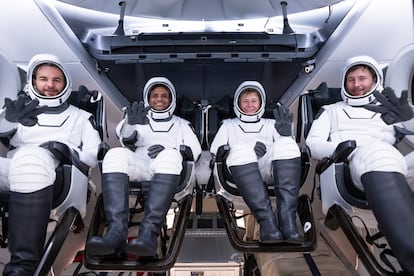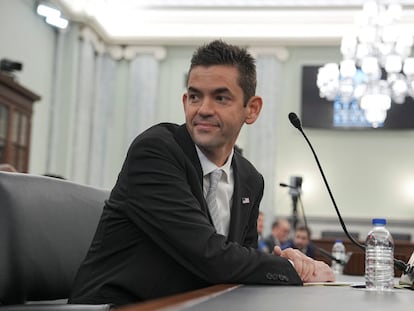An air leak on the International Space Station grounds four astronauts.


An Indian, a Polish man, a Hungarian man, and an American woman were scheduled to fly to the International Space Station (ISS) this week, but their flight—the private AX-4 mission, operated by the space company Axiom —has suffered several setbacks before takeoff. First, the launch scheduled for this Wednesday was delayed due to a problem with the propulsion system of the SpaceX rocket that was supposed to send the astronauts to the ISS . Now, the US space agency (NASA) and the private company have decided to indefinitely postpone the mission due to an air leak in the Russian Zvezda module of the space station.
For now, there's no new date for the mission to take the first Indian astronaut into space, giving NASA and the Russian space agency Roscosmos time to continue investigating the air leak, which was first detected in 2019. Since then, Russian astronauts on the ISS have made various repairs to the affected module, and the problem has sparked a dispute between the two main agencies responsible for the space station. As a result of monitoring the incident, an anomalous pressure measurement was detected on Thursday.
“As part of an ongoing investigation, NASA is working with Roscosmos to understand a new pressure signal following the recent repair effort on the aftmost segment of the International Space Station’s Zvezda service module,” the US space agency said in a statement , adding that cosmonauts have sealed some additional areas and remeasured air leakage. “Following this effort, the segment is now holding pressure.”
Although it is a mission operated by a private company - the Axiom company - and on board a commercial SpaceX ship, Ax-4 is not a space tourism visit to the ISS nor a flight in search of media records like the Polaris Dawn commanded by Jared Isaacman in September 2024. All members of the fourth Axiom mission are astronauts qualified by government space agencies and their task is to spend about two weeks on the space station carrying out scientific experiments.
This mission is historic for India: during the flight, the crew member designated as the pilot of the craft is Indian Shubhanshu Shukla, who would thus become the first astronaut from his country to go into space since 1984, when Rakesh Sharma flew. Also marking this milestone would be the two mission specialists: Hungarian Tibor Kapu and Polish Sławosz Uznański-Wiśniewski, sent by the European Space Agency (ESA). Both Hungary and Poland can boast of having put astronauts into space, but they did so during the previous space race, when these two countries were part of the Soviet bloc. Since then, they have not participated in manned space flights.
For the three men on the postponed mission, it would be their first spaceflight. In contrast, mission commander Peggy Whitson, an American, is a veteran of the spaceflight. She was a NASA astronaut until 2018, and no American, male or female, has spent more time in space than her (675 days). With NASA, she performed 10 spacewalks and became the woman with the most hours spent floating in space during those activities outside a spacecraft; only Sunita Williams, earlier this year, has broken that record. After retiring from NASA, Whitson returned to space with Axiom in 2023 during the Ax-2 mission, very similar to the one that has just been postponed due to the air leak on the ISS.
Do you want to add another user to your subscription?
If you continue reading on this device, it will not be possible to read it on the other device.
ArrowIf you want to share your account, upgrade to Premium, so you can add another user. Each user will log in with their own email address, allowing you to personalize your experience with EL PAÍS.
Do you have a business subscription? Click here to purchase more accounts.
If you don't know who's using your account, we recommend changing your password here.
If you decide to continue sharing your account, this message will be displayed indefinitely on your device and the device of the other person using your account, affecting your reading experience. You can view the terms and conditions of the digital subscription here.

Editor and co-founder of Materia, the Science section of EL PAÍS. He previously worked as a journalist at 'La Voz de Galicia' and wrote about science and technology for 'Heraldo de Aragón' and BBVA OpenMind. He holds a degree in Chemistry, a Master's degree in Journalism, and a degree in Science Museum Outreach.

EL PAÍS






